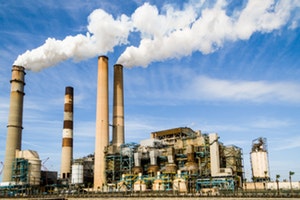Global carbon emissions increase but rate has slowed
04 December 2019

Global carbon emissions are set to grow more slowly in 2019, with a decline in coal burning offset by strong growth in natural gas and oil use worldwide, according to researchers at the University of Reading.
The Global Carbon Project published its annual analysis of trends in the global carbon cycle on Wednesday (4 Dec), including the first full-year estimate of the increase in carbon dioxide emissions from burning fossil fuels in 2019.
Emissions from burning fossil fuels are projected to grow by 0.6% (range: –0.2 to +1.5%) this year to reach almost 37 billion tonnes of carbon dioxide (CO2). This is down from 1.5% in 2017 and 2.1% in 2018.
This lower rate of growth is due to substantial declines in coal use in the EU and US, and slower growth in coal use in China and India compared to recent years. Weaker economic growth has also contributed to this trend.
Dr Patrick McGuire, land surface processes computational scientist at the University of Reading and NCAS, who worked on the report, said: “It has been four years since the Paris Agreement yet carbon emissions and global temperatures continue to rise.
“Reducing carbon emissions is fundamental to efforts to tackle climate change, and although the slow in growth of emissions revealed by this report is welcome it is nowhere near enough to allow us to meet our targets and avoid some of the worst consequences of climate change.”
Reading scientists worked on the Global Carbon Project report with colleagues around the world, including scientists from the University of East Anglia (UEA) and University of Exeter. Reading’s experts ran simulations on the CEDA JASMIN super-data-cluster with the Sheffield Dynamic Global Vegetation Model for the past three centuries to estimate how effective plants and soil are at absorbing carbon dioxide from the atmosphere, and how land use changes had impacted this.
The report also showed that natural gas has seen the fastest fossil fuel emissions growth in 2019, with a projected increase of 2.6% (+1.3 to +3.9%). Oil used in transport is also driving emissions up, with a projected increase of 0.9% (+0.3 to +1.6%) this year, while emissions from coal burning are projected to decrease by 0.9% (-2.0 to +0.2%).
Emissions this year are likely to be 4% higher than in 2015, the year of the UN Paris Agreement, which set a global temperature rise limit of 1.5°C or well below 2°C.
As international governments gather at the UN Conference of the Parties (COP25) in Madrid this week, the team behind the annual update of the Global Carbon Project call for policies directed at phasing out the use of fossil fuels, in addition to more urgent and large-scale deployment of renewable energy and other low-carbon technologies.
